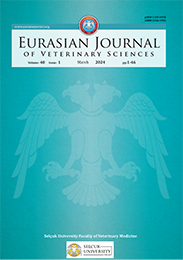| 2020, Cilt 36, Sayı 3, Sayfa(lar) 199-203 |
| [ Türkçe Özet ] [ PDF ] [ Benzer Makaleler ] |
| Evaluation of Nigella sativa's cold press oil as vaccine adjuvant |
| Uçkun Sait Uçan, Aslı Sakmanoğlu, Ali Uslu, Zafer Sayın, Ecem Oğlakçı Cansoy |
| Selcuk University, Veterinary Faculty, Department of Microbiology, Konya, Turkey |
| Keywords: Thymoquinone, adjuvant, ovalbumin, mouse |
| Downloaded:581 - Viewed: 1818 |
|
Aim: In order to identify an organic and plant based, less toxic, cheaper
and more effective adjuvant, a cold pressed oil of Nigella sativa
(CPNSO) and one of the essential components of Nigella sativa oil
(NSO), thymoquinone (Thymoquinone ) were investigated as adjuvant
candidates.
Materials and Methods: Adjuvant potentials of the both were measured by examining specific antiibody titers to ovalbumin given in presence of either of CPNSO or thymoquinone, in vivo. Such potentials of thymoquinone alone (A1), CPNSO (A2), mCPNSO (experimentally formed by addition of thymoquinone to CPNSO making up mCPNSO that was contained 10% more thymoquinone than original CPNSO did; A3) and Al(OH)3 (A4) in presence of ovalbumin in Swiss albino mice (n=36, female). The effects were determined by measuring anti-ovalbumin antibodies after immunization to ovalbumin by home-made ELISA in mice. Results: Sera and conjugate were optimally diluted 1/200 and 1/40.000, respectively. Mean OD values at 450 nm of the groups control (A0), A1, A2, A3 and A4 were 0,043 (± 0,002), 0,668 (± 0,074), 0,644 (± 0,018), 0,675 (± 0,066), and 0,745 (± 0,09), respectively. Conclusion: By comparison control, all three (A1, A2, A3) of the test formulations were found to be as effective as commercial (A4) formulation in triggering humoral response to ovalbumin (p > 0,05). Therefore, each of Nigella sativa based adjuvant candidates has an alternative potential to Al(OH)3 in the mouse. |
| [ Türkçe Özet ] [ PDF ] [ Benzer Makaleler ] |




